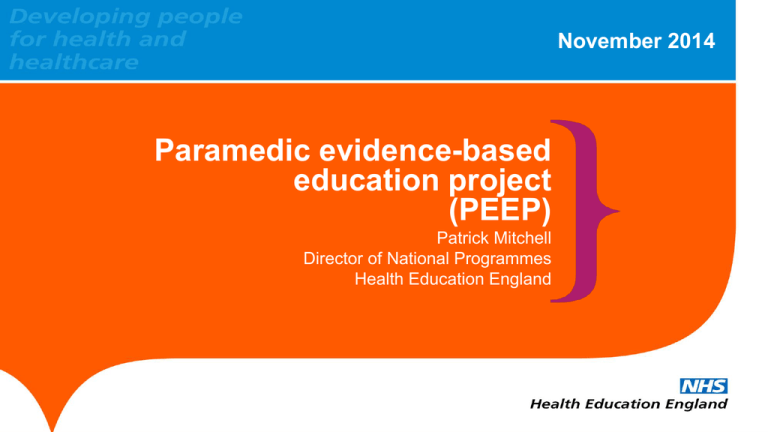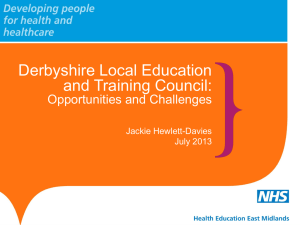Patrick Mitchell HEE - Association of Ambulance Chief Executives
advertisement

November 2014 Paramedic evidence-based education project (PEEP) Patrick Mitchell Director of National Programmes Health Education England Background • Commissioned by DH’s National Allied Health Professional Advisory Board - funded by the College of Paramedics, reporting in August 2013 • Provides an evidence base to progress the strategic direction of the standardisation of education and training • Various education and funding models in place across the UK - PEEP seeks to address these issues • Delivery lies with Health Education England (HEE), the College of Paramedics and the Association of Ambulance Service Chief Executives www.hee.nhs.uk www.hee.nhs.uk PEEP Report • • • Passed over to HEE in July 2013 HEE asked College of Paramedics to co-chair an oversight national steering committee Devolved nations invited to be active participants to deliver UK solution The paramedic profession is the only AHP: o With no single education level entry route to registration with HCPC o No clearly defined or aligned career structure leaving inconsistency in titles, scope of practice and purpose Advanced prescribing necessitates both to be agreed and in place before the non-medical prescribing board will consider a business case from the profession www.hee.nhs.uk www.hee.nhs.uk Recommendations from PEEP • • • • • There should be a nationally agreed approach to the commissioning and funding of paramedic education with access to bursary funding Models of pre-registration education and training should align with other non medical professions and lead to an all graduate profession There should be a review of the College of Paramedics scope of practice and HCPC standards of proficiency Evaluate education and development opportunities for the existing workforce and embed a whole systems approach to enhance the learning environment for the student paramedic There should be an enhancement of clinical skills and clinical decision making developed through the College of Paramedics curricula www.hee.nhs.uk www.hee.nhs.uk Clinical Skill Enhancement There should be additions to the clinical skills in pre-registration training in the areas of: • Dementia and mental health awareness • Clinical leadership skills • Multi-professional learning opportunities • Integrated care • End of life care • Inclusion health There should be a closer engagement of this workforce with pre-hospital urgent care, and prevention of hospital admission, should be of benefit to the wider community. www.hee.nhs.uk www.hee.nhs.uk PEEP report and recommendations There are two critical interdependencies to the engagement programme: Consultation on paramedic prescribing • Intention to commence public consultation on paramedic prescribing by the end of the calendar year • To be delivered in advance or alongside PEEP strategy consultation in order to ensure stakeholders can present an informed view The outcomes of Keogh’s urgent and emergency care review • PEEP is a major contributor to the success of both hear and treat & see and treat strategies • New paramedics roles in ED and primary care settings • Will require a significant increase in training capacity at scale www.hee.nhs.uk www.hee.nhs.uk Delivering PEEP – project structure Ways of working /scope of practice Workforce planning Education & Training Steering Group Finance Commission-ing Comms & engagement www.hee.nhs.uk www.hee.nhs.uk PEEP Report Recommendation Sub Group Leading 1.0 Standardised approach to education and training Scope of practice and ways of working 1. Nationally agreed approach to commissioning and funding Finance 1.2 Access to bursary funding Finance 2.0 Pre-registration education development model leading to an all graduate profession Scope of practice and ways of working 3.0 Models of pre-registration education and training Scope of practice and ways of working 3.1 Knowledge and skills enhancement Scope of practice and ways of working 3.2 Content Scope of practice and ways of working 3.3 Clinical decision making Scope of practice and ways of working 4.0 Partnership model Workforce planning 5.0 Paramedic leadership for England Scope of practice and ways of working 6.0 Standardised approach to identification Communications Clinical models Urgent Care Steering Group Education models Clinical standards Ways of working & Scope of practice sub group • • • • • • There should be a standardised approach to all aspects of education and training for paramedics Paramedic registration should be at BSc level by 2019/20 Supports amendments to the scope of practice and curricula developed by the College of Paramedics Supports a national model of commissioning and funding for pre-registration paramedic education (model still to be determined) Pre-registration paramedic education should be included in the new National Standard Education Framework Agreement Agrees Standards of proficiency and standards of education and training together with the College of Paramedics curricula guidance and competency framework will be submitted for independent educational levelling to confirm the standards of education at BSc level. www.hee.nhs.uk www.hee.nhs.uk Current position The steering group have recommended further work be undertaken before being presented to HEE Board for approval • Steering group with two new groups recently formed to review: o Educational modelling to develop options programme delivery and educational funding o Paramedic employers group supported by NHS Employers to assess employment implications of the changes of the paramedic role including union consultation • Workforce planning and modelling of options based on training commissions required to meet urgent and emergency care review and other needs of new models of care. www.hee.nhs.uk www.hee.nhs.uk Transition recommendations The steering group has supported: • That education and development opportunities for the existing workforce should be considered and a transition plan formed • That organisations should have mentoring and preceptorship arrangements in place consistent with the curricula requirements • That an engagement programme needs to be delivered from a national platform to have the necessary influence, supported by local delivery plans Specific consideration in transition planning should be given to: • The current paramedic workforce • Impact on skill-mix • The current technician workforce • Impact on employee relations • Impact on terms and conditions • Staff engagement www.hee.nhs.uk www.hee.nhs.uk Managing Transition Education Development Employment Issues Workforce Planning www.hee.nhs.uk www.hee.nhs.uk Next Steps • • • • • • • • • • Complete educational levelling Financial viability to be fully assessed Assessment of workforce numbers - options Requirements and transition planning for up-skilling the current workforce Communications strategy to be developed Employers group to assess job design and alignment within current agenda for change framework NHS commissioner engagement Union consultation Discussion with HCPC Development of an implementation plan www.hee.nhs.uk www.hee.nhs.uk Next Steps • • • • • Further discussions with key stakeholders including employers, commissioners and unions HEE Board approval March 2015 Final sign off nationally with employers and commissioners Formal notice to higher education institutions Finalise timeline with HCPC www.hee.nhs.uk www.hee.nhs.uk Questions? www.hee.nhs.uk www.hee.nhs.uk







